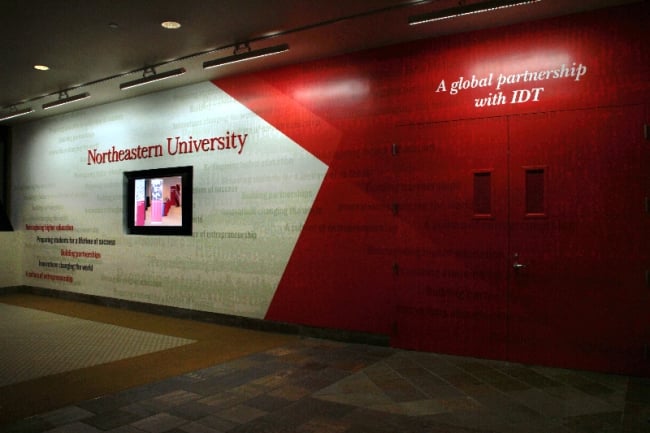You have /5 articles left.
Sign up for a free account or log in.

Northeastern University's hub at Integrated Device Technology's San Jose campus.
I.D.T.
Silicon Valley’s “war for talent” has technology companies tempting potential recruits with benefits such as egg freezing, gourmet cafeterias and private shuttles. But few can match semiconductor producer Integrated Device Technology’s latest perk: a graduate school in the office.
Northeastern University on Monday officially unveiled its latest branch campus, adding to its locations in Charlotte, N.C., and Seattle. Unlike those campuses, which are free-standing, the university’s Silicon Valley branch will be hosted at multiple hubs in the Bay Area, sharing space with the region’s tech companies.
Northeastern, as opposed to the many universities that have established branch campuses abroad, has focused its expansion efforts within the U.S. While its undergraduate student population and research centers remain in Boston, the university is increasingly taking its graduate offerings to professionals in the regions where they work.
"The traditional notion of a university that is defined by a campus is now replaced by the notion of a university that has a global presence and different manifestations, physical and otherwise,” Joseph E. Aoun, Northeastern’s president, said in an interview. “We are not looking to expand for the sake of expanding.… We are looking for vibrant, urban environments where there are activities that are exciting and we can be a part of, add to and also benefit from. We clearly couldn’t ignore Silicon Valley. Who could?"
Since Northeastern plans to offer hybrid certificate and degree programs in the Bay Area, the university’s locations there will need only “lighter” infrastructure than a full campus, said Philomena Mantella, senior vice president and chief executive of the institution's Global Network. “It won’t have residence halls or climbing gyms. It will have those things that relate to the learning experiences that we’re offering there.”
Although she declined to discuss expansion plans, Mantella said the university is studying everything from Silicon Valley’s industry clusters to its traffic patterns to determine where it should place future hubs. “I don’t know if the magic number is three or four, but we could imagine having clusters associated with health, technology in different areas of the San Francisco region,” she said.
I.D.T., for example, is giving the university a floor of its campus in southern San Jose. The hub will initially offer a master’s degree program in engineering management and two stackable certificates in data science and technology project management. This fall, those programs will be open to anyone. Boston-based faculty members have taught pilot courses enrolling I.D.T.’s employees since January, but the university plans to recruit faculty in the area as well.
Gregory L. Waters, C.E.O. of I.D.T. and a graduate of Northeastern, said the company hasn’t set any goals for how many employees it hopes enroll and graduate. I.D.T. will benefit from the partnership with Northeastern in three ways, he said: in addition to it giving the company a “competitive edge” and employees a “tremendous educational opportunity,” the presence of a university could mean opportunities for cooperative research projects.
Beyond opening the programs to all Bay Area residents, both Northeastern and I.D.T. listed a number of potential future projects. The university, for example, hopes to build a “research ecosystem” connecting employees and faculty members at its future hubs, and Mantella said corporate leaders may serve as adjunct instructors. Waters said I.D.T. may work more closely with Northeastern on the company’s leadership program.
While the university said it would “collaborate with partner companies, such as I.D.T., on tailoring curriculum and creating real-world experiential opportunities,” Waters suggested a more hands-off approach.
“They are the university,” Waters said. “It’s not like we’re in there telling them how to teach -- nor do we want it.”
Nor did Waters express any qualms about opening up his campus to people outside I.D.T., even if that means bringing employees from competing companies into the office. “A year from now, I would suspect the majority of the student population to be non-I.D.T.,” he said.
Since the degree and certificate programs include face-to-face components, their growth will be more limited that than of fully online programs. Mantella defended the university’s strategy to offer hybrid programs by emphasizing its belief in place-based education.
“Some of that comes from the way in which we look at education, where we say students can’t learn isolated on campus,” Mantella said. “It’s kind of an extension of who we are to say that place matters, being a part of a community matters. That allows us to be more experiential, because you’re so tuned in with corporate and regional issues.”
Waters, meanwhile, said he expects many I.D.T. employees will choose to enroll in degree programs offered by other universities, even if studying at Northeastern would be more convenient. “There’s no reason why they wouldn’t do that and continue to do that,” he said. “Northeastern will not be the right university for every employee.”
I.D.T. already offers tuition reimbursement for its employees and will further subsidize programs through Northeastern. Waters declined to say how much the company will cover.
Aoun hinted that Northeastern may soon expand outside the U.S. The university already has an international business program and offers study-abroad opportunities, but such a venture would mark a first for the institution.
“We decided to start on a national level and understand the needs of each region and hone our skills in the sense that our approach is not one size fits all,” Aoun said. “Now we feel that we are poised, we understand the different needs, we are meeting them and are ready to meet them in Silicon Valley. And we are ready to explore the world.”




